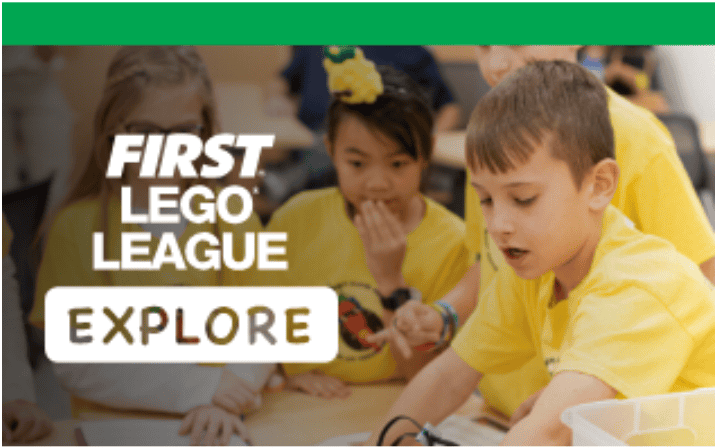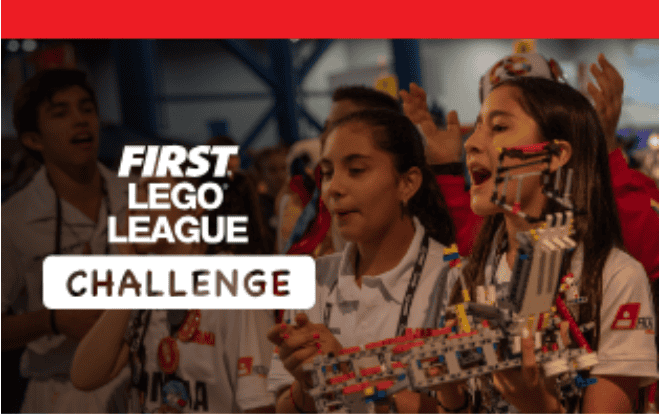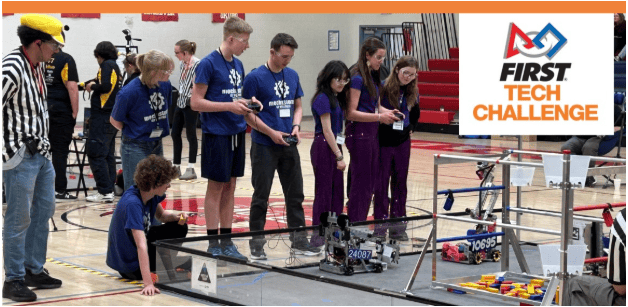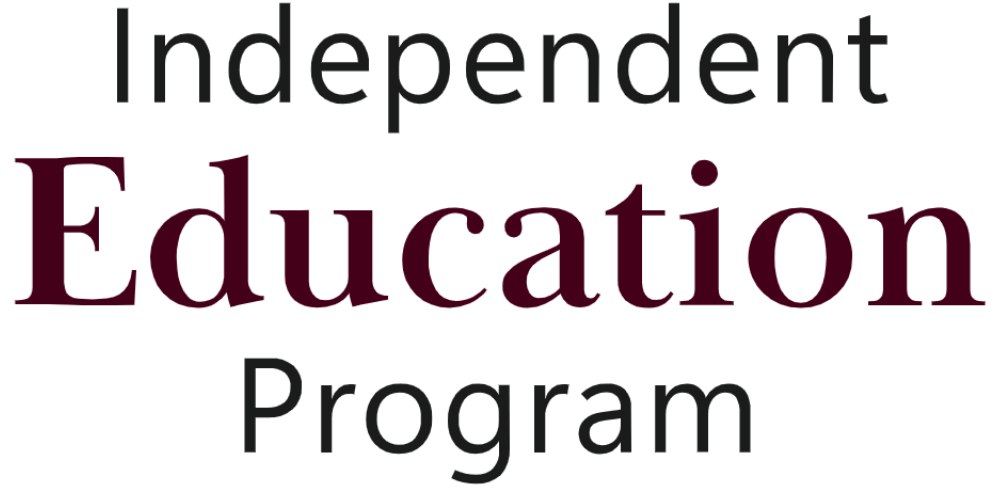Robotics Classes Are Open!
The Independent Education Program is thrilled to announce the expansion of its Robotics Program - and classes are open along the Wasatch Front. With classes for students ages 6-18, there’s something for everyone!
Robotics classes use FIRST robotics projects, challenges, and competitions to bring the world of STEM to students along with experiences in teamwork and problem solving, creative thinking and more.

FLL Explore Teams (Ages 6-10)
Explore teams focus on the fundamentals of engineering, solving problems, designing and coding with Lego bricks and SPIKE Essential.
Classes run August 25-December 12, 2025 and include a showcase with all the Explore teams. $550 + $100 Enrollment Fee. A full list of Classes can be found on the Registration Page: https://ieprogram.org/registration/

FLL Challenge Teams (Ages 10-14)
Challenge teams design, build and program Lego SPIKE Prime robots to compete in competition. Teams also conduct research, develop innovative solutions, and present their findings in an FLL Qualifier competition.
Classes run August 25-March 13, 2026** and include 1 qualifier competition in January or February to qualify for State. $700 + $100 Enrollment Fee.* A full list of Classes can be found on the Registration Page: https://ieprogram.org/registration/
*The Enrollment Fee is paid once per student, per year. If you have already paid the Enrollment Fee for 2025-2026, contact admin@ieprogram.org for a coupon code.

FIRST Tech Challenge (FTC) (Ages 14+)
FTC teams design, build, program, and operate robots to compete in a head to head game based competition against other FIRST Tech teams.
Classes run August 25-March 13** and include a qualifier competition in January or February. $1400 + $100 Enrollment Fee.* A full list of Classes can be found on the Registration Page: https://ieprogram.org/registration/
*The Enrollment Fee is paid once per student, per year. If you have already paid the Enrollment Fee for 2025-2026, contact admin@ieprogram.org for a coupon code.
***Tech Team members will have the opportunity to apply to mentor Challenge and Explore teams to offset the cost of their tuition.
Registration for FIRST Tech Challenge is by application. Apply to be on the team here FTC Application Form
Join us for an exciting journey into STEM, robots, teams and lasting friendships!
Questions? Email charlotte@ieprogram.org
**Teams that qualify for additional competitions will have additional classes and fees.
***Students can apply to mentor Challenge and Explore teams in the FTC application
Robotics FAQ
- Why do Robotics classes end earlier than other classes?
FIRST robotics competitions take place in January and February each year. Classes are designed around the competitions. Once the competitions are over, classes will end for the year. Just like in sports competitions, if a team advances to the next level of competition, additional classes will be scheduled.
- What happens if my team qualifies for other competitions?
Additional classes will be scheduled to prepare for the next level of competition. There will be some additional expenses.
- How does the teen mentorship program work for Explore and Challenge teams?
Each explore and Challenge team will have a head coach and a teen mentor from a FIRST Tech team. All students benefit from this set up as younger students learn from teen mentors and teen mentors benefit from leading and teaching as they work to offset their own tuition.
- What is FIRST Robotics?
FIRST (For Inspiration and Recognition of Science and Technology) Robotics is a global non-profit organization that runs several robotics programs for students aged 4-18, with the goal of inspiring young people to pursue careers in science, technology, engineering, and mathematics (STEM).
You can learn more about FIRST classes in this video: https://www.youtube.com/watch?v=kkN08bDv9EI
- What can I expect in an Explore Robotics class?
Explore classes introduce students (ages 6-10) to STEM concepts through hands-on, project-based learning with LEGOs. Teams explore real-world themes, research problems, design and build LEGO models, and showcase their work at celebrations. Explore classes meet for 1 ½ hours per week.
- Investigate a real-world theme: Each season, teams delve into a specific theme, exploring its challenges and potential solutions.
- Research and design: They conduct research related to the theme, brainstorm ideas, and design LEGO models to represent their solutions.
- Build with LEGOs: Teams use LEGO Education SPIKE Essential sets to build their models, incorporating a moving part to demonstrate their findings.
- Code and program: Explore basic coding and programming concepts to make their models move or interact.
- Collaborate and communicate: Teams work together, sharing ideas and responsibilities, and present their work to others.
- Showcase their work: They create a "show me" poster and present their models and findings at a celebration event, sharing their journey and learning with others.
- Develop STEM skills: The program helps students develop computational thinking, engineering skills, and an understanding of STEM concepts.
- Emphasize teamwork and fun: The program encourages collaboration, creativity, and a positive learning experience rather than competition.
- What can I expect in a Challenge Robotics class?
A Challenge robotics team designs, builds, programs, and competes with robots in a variety of challenges. They focus on developing STEM skills, teamwork, problem-solving, and engineering principles through hands-on experience. Teams also engage in community outreach. Challenge teams meet 2 hours per week and compete in 1 Qualifier competition in January or February.
Here's a more detailed breakdown:
- Design and Build: Teams start with a specific challenge or game, often provided by organizations like FIRST Robotics. They then design and construct a robot using a kit of parts or custom components, working with mechanical and electrical systems.
- Programming: Robots need to be programmed to perform specific tasks. Students learn to code in various languages and develop autonomous and driver-controlled programs.
- Competition: Robots are tested in competitions where they face off against other teams. These competitions often involve alliances between teams and can include various challenges like scoring points, navigating obstacles, or completing tasks.
- Teamwork and Collaboration: Robotics teams emphasize teamwork, communication, and problem-solving. Students learn to work together, delegate tasks, and support each other throughout the design, build, and competition process.
- Community Engagement: Many robotics programs encourage teams to engage with their community through outreach activities, sharing their knowledge and passion for robotics with others.
- Developing STEM Skills: Robotics challenges provide a practical way for students to develop and apply their knowledge of science, technology, engineering, and mathematics.
- Engineering Notebook: Many competitions require teams to document their design process, problem-solving strategies, and testing results in an engineering notebook.
- What can I expect in a First Tech (FTC) Robotics class?
A FIRST Tech Challenge (FTC) team designs, builds, and programs robots to compete in a sports-like, head-to-head competition. Teams also focus on fundraising, marketing their team brand, and engaging in community outreach. Participants develop STEM skills, learn engineering principles, and foster teamwork, public speaking, and problem-solving abilities. Teams meet for 3 hours per week.
- Robot Design and Construction: Teams design and build robots that can perform specific tasks outlined in the annual game challenge.
- Programming: The robots are programmed to follow instructions, often using a variety of coding languages, to execute tasks autonomously and under human control.
- Competition: Teams compete in alliance-based matches against other teams, navigating a 12' x 12' field to score points by completing tasks with their robots.
- Engineering Portfolio: Teams document their design process, programming, outreach efforts, and team activities in an engineering portfolio, which is a key aspect of the competition.
- Community Outreach: FTC teams engage with their local community by demonstrating their robots, starting new teams, volunteering, and promoting STEM.
- Fundraising and Marketing: Teams raise money to support their activities and develop a brand to represent their team, often showcasing their work and passion for STEM.
- Skill Development: Though these activities, students develop valuable STEM skills, learn about engineering principles, and practice important soft skills like teamwork, communication, and problem-solving.
- Scholarships: Participants are eligible to apply for over $80 million in college scholarships.
- Does my student have to know about robotics to be on a First Tech team?
No. Students do not have to have experience with robotics to be on an FTC team. Teams benefit from students with a range of interests and skills including:
- Innovation
- Engineering
- Technology
- Programming
- Problem Solving
- Real-World Presentations and Pitches
- Business
- Statistics
- Analysis
- Web Design
- Portfolio Creation
- Team Promotion
- Outreach and Volunteerism
You can be an asset to an FTC team if you have interest in bringing what you have, being willing to learn and to work, and coming with a good attitude.
- What will my student learn about through Robotics?
There is so much to learn through robotics. Robotics students will have opportunities to learn valuable hard and soft skills including STEM (science, technology, engineering, and math) principles through hands-on robot building and programming. There are opportunities to develop and use business, statistics, analysis, web design, portfolio creation, and presentation skills. They also develop problem-solving, teamwork, and communication skills. Students participate in mentorship, leadership, and have career exploration opportunities.
- Why is Robotics so expensive?
Robotics is expensive due to a combination of factors, including FIRST registration fees, the cost of robot construction, the need for tech and specialized equipment.
